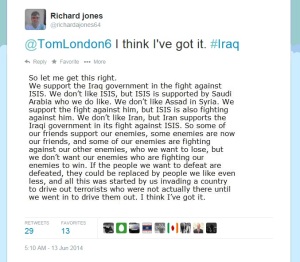Revenge is a dish best served with reason and humanity.
In his response to the terrible acts of terror perpetrated in Paris the French President, Francois Hollande promised that France would be “pitiless” in its response to terrorism and seek a “merciless’ revenge on the barbarians of Islamic State group.” I can understand this emotion. Watching the events unfold on the worlds media who could not feel a sense of outrage and anger towards those who had cut short the lives of so many innocent people. We feel this because we are human, and this feeling is a perfectly normal and predictable response. We do not however extend, or even attempt to understand, how this human response is generated by our own actions. When on the 29th September 130 people were slaughtered at a wedding ceremony in Yemen by the Saudi-led coalition, with weapons supplied by the West, how should their relatives and friends feel, never mind the ordinary citizens of Yemen? Do they now have the justification for merciless and pitiless revenge on the perpetrators of those killings? When the drones targeting al-Qaida leader Ayman Zawahiri, unleashed their payloads over a village in Pakistan called Damadola, killing 76 children and 29 adults, while missing their intended target, have they not also induced the human response of wanting revenge. The victims of ‘collateral damage’ in Afghanistan, Iraq and now Syria number in their tens of thousands. Each one the potential source for the human desire of retribution. Twitter is full of people, from all sides, who have never directly been affected by these events, calling for reciprocal acts of violence regardless of the consequences to other innocent people. I in no way mean to give a justification to the people who committed the atrocities in Paris, but neither do I believe that if we in our quest for vengeance kill other innocent people, even if unintentionally, it will do anything other than make the likelihood of further attacks more probable. The solution to defeating Islamic State is to prevent the flow of people associating with their cause. We do this by behaving within the realms of international law, working within the United Nations, maintaining and not eroding the human rights that we currently enjoy, and by treating all the victims of Islamic fundamentalism with the same sense of empathy and concern, not just those who live in the West. We will never defeat IS without the Islamic majority feeling that the West treats all members of the human race with equal humanity. At the moment there is a clear value difference given to the lives of victims of terror in the West and the lives of the collaterally damaged in the East. And for all those who will scream that it is the Islamic fundamentalists who are the greatest sinners, I whole heartedly agree, but just because they murder with impunity doesn’t mean we should.
http://www.theguardian.com/us-news/2014/nov/24/-sp-us-drone-strikes-kill-1147
http://www.bbc.co.uk/news/world-middle-east-34388463
http://www.washingtontimes.com/news/2015/oct/15/90-of-people-killed-by-us-drone-strikes-in-afghani/



